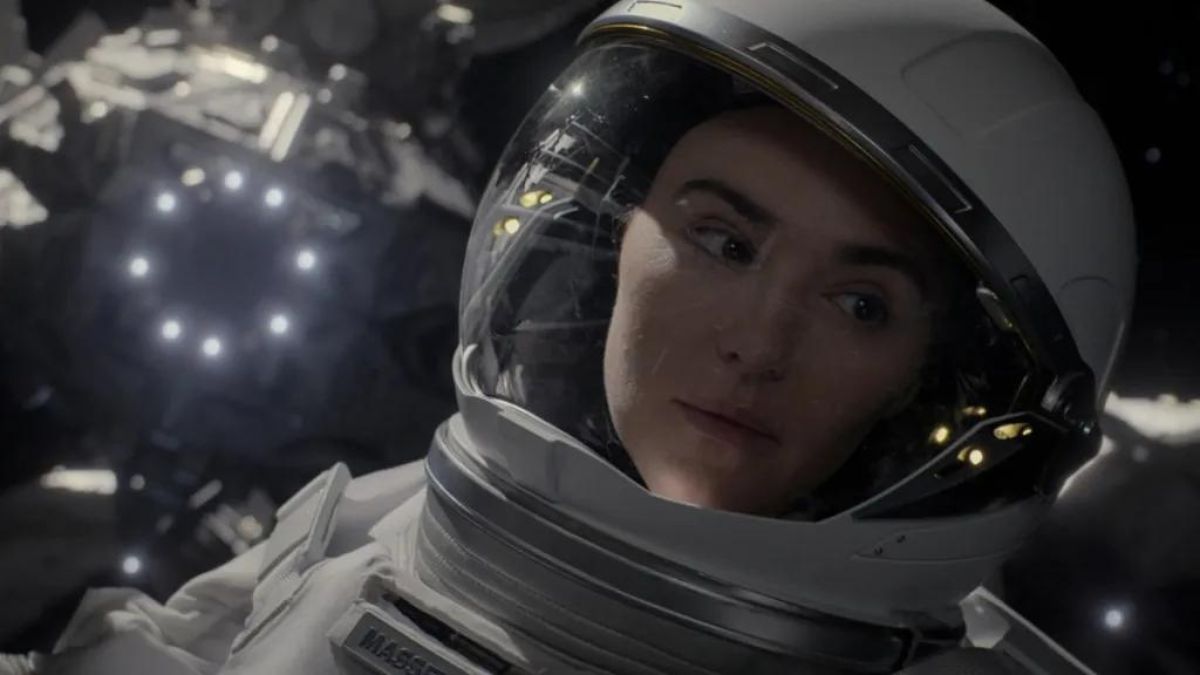
For All Mankind S4E10: Perestroika
We opened the season skeptical that the asteroid-capture mission had the heft of the races to the moon and Mars in the first and third season, or the Cold War tensions of the second, but knowing that ultimately, the show succeeds and fails on the strength of its characters.
This week, the show failed. Yes, the asteroid capture mission was resolved. Last week gave us two possibilities — either Ed, Dev, and their band of rogues would steal the asteroid and push it into Mars orbit, or Dani, Aleida, and the folks at NASA would keep it on course to Earth. Fans of the show won’t be surprised that neither of those things happen, but the unexpected third thing simply doesn’t have the power of Dani’s handshake in space defusing a nuclear war in season 2, or the Johnson Space Center bombing at the end of last season. It’s simply yet another plot contrivance in a long run of them, that gets the asteroid where the writers have transparently wanted it to go from the start.
Sometimes, you need a plot contrivance. They’re something you can forgive if it takes the story or the characters to an interesting place. But to get the episode where the writers want it to go, the writers use contrivance after contrivance, and at the end of this frustrating, wildly uneven season, I’m left asking: what characters?
As always, the key player of the plot is Sam, and Tyner Rushing does her best to make the character someone we can root for — and those are few and far between this season — but she’s given so little to work with. We don’t know her backstory, she doesn’t have relationships with anyone but Miles, and she has no real motivation, apart from doing what the plot requires from moment to moment. Two weeks ago, she was fighting tooth-and-nail against Dev over his unfair treatment of his workers. This week he asks her to risk her life on a mission that will only questionably help her and will almost certainly land her in Mars Jail, and she does so without question.
In fact, virtually every character on the show belongs in jail for somewhere between 10 and 100 years by the end of this episode, but it’s not clear there are any consequences for any of them. And as we’ve discussed in the last few reviews, there’s really no one to root for, given the characters are either unlikeable through and through, too thinly drawn to care about, or legacy characters like Ed and Dev who have curdled with old age.
Only competent, fundamentally decent Dani comes off well, but while you need someone like that in a show about smart, heroic astronauts, she’s not terribly interesting this season, except as a foil for the more erratic characters around her. And while she’s always easy to root for, the show doesn’t make it easy to root for her side. As she and NASA try and root out the saboteurs on Happy Valley, the CIA and KGB agents have caught Miles and torture him for information. It’s hard to feel that bad for Miles — they’re absolutely right when they point out the incompetent criminal made his own bed. But it’s also hard to root for the torture squad.
And it’s hard to root for the saboteurs. Or the Soviets getting rich off the asteroid. Or basically anyone in this episode. The show sets the stakes of the asteroid mission as, get a lot of valuable metals to Earth that will help everyone, or leave the asteroid orbiting Mars, which will force NASA and Roscosmos to keep investing in the red planet, and in theory, further space exploration. But it’s hard to root for either of those outcomes. The benefits to Earth are very abstract — we know the asteroid will “change everything” only because the characters keep telling us so all season. But as previously discussed, Team Mars are all selfish assholes, apart from thinly-developed Sam.
More to the point, at the end of the day this is a show about NASA. No matter what philosophical points the selfish assholes have on their side, it doesn’t feel natural to root against the smart, competent people at NASA completing a mission for the good of all mankind. That’s just not what this show has been. Whatever issues you might have with policing in America, an episode of Law & Order that asks you to root for the criminal to get away with it simply doesn’t work, and that’s essentially what the back half of this season is asking of its audience.
Maybe the season was doomed from the start. It was, by nature, a transitional year, with the original lead characters either written off the show or aging out, and the wonder of space exploration giving way to the workaday maintenance of a permanent presence in space. But the early seasons of the show did a masterful job of planting seeds that would bear fruit later — Aleida started as a child with no obvious connection to the story, and has become one of the characters we’re most invested in.
This season has dropped the ball. This season seemed like it was set up to pass the generational torch from Ed, Dani, and Margo, to Aledia, Kelly, and the new characters. But the new characters are all under-developed (Daniel Stern was a good “get” for the casting department, but his Eli Hobson had less to do as NASA’s chief than Dan Donohue did with far less screen time as the early-season boss, and it’s not clear he’ll be back next year.) And Kelly — who didn’t have very much to do this season, but whose search for life on Mars seemed like it could be the unifying event to resolve this year’s tensions — only appears an hour into the episode and doesn’t have a single line. We expected her dad to either go out in a blaze of glory or get his comeuppance, but he gets no resolution whatsoever, which we suppose means we’ll get 80-year-old Ed grumbling in a Mars nursing home in season five.
So that leaves only Aleida and Margo. Margo — the only one with a satisfying story this season — gets a mostly satisfying resolution (although like everything in this episode, the how and the why makes very little sense), and she does successfully pass the torch to her protégé. But that involves a scene where, at an incredibly tense moment at Mission Control when both of these very vital figures need to be doing their jobs, they have a private conversation so Margo can say, essentially, “my mentor, Wernher von Braun, inspired me but did terrible things, and I, your mentor, inspired you but did terrible things, but I can try and take more responsibility for them than he did, and you can move out of my shadow as I moved out of yours.” We’ve already seen Aledia grow up and out of Margo’s shadow in the past, and with just a bit more subtlety.
So what now? We don’t even get the satisfaction of an exciting glimpse of the future in the postscript. Sure, we do end on a brief look ahead to 2012. But it’s neither the promise of possibility that the expanded Jamestown at the end of season one, or the boots on Mars at the end of season two gave us. Nor does it have the shock of last season’s reveal of an alive-and-well Margo. It simply confirms that the events of the episode turned out exactly how you expected.
The show’s irresistible premise will no doubt have viewers coming back for more, but neither this season nor this episode gave us much reason to.
Stray asteroids:
• The season’s first episode was called “Glasnost,” the Russian name for Mikhail Gorbachev’s real-life policy of giving the infamously secretive Soviet government more transparency and pushing the country to be slightly more democratic. Which is episode-appropriate, as we learn that his reforms have turned the USSR into a thriving economy, an ally of the US, and the Cold War is declared over. This last episode is called “Perestroika,” Gorbachev’s set of policies that modernized the Soviet economy and took steps towards embracing capitalism. What does that have to do with this episode? Absolutely nothing! In keeping with the rest of the episode, it’s a non sequitur that nonetheless tries to bring things full circle.
• We probably could have mentioned this at any point this season, but while Ed’s old-age makeup is occasionally distracting, and they didn’t really bother aging up Dani beyond a few gray hairs, 40-year-old Wrenn Schmidt does a fantastic job at playing 70-ish Margo. She doesn’t make a big show of having a limp or anything, she’s just a little slower and has a little more trouble getting around than the younger Margo of past seasons. It’s not clear whether we’ll see any of elderly Margo in the next season, but if this is her last hurrah, she’s went out on a high note, having been the highlight of an uneven season.
• This season is especially frustrating because it could have all worked with very few changes. Get rid of Miles and give all the time spent on developing his character to Sam. Have Ilya take Miles’ part in the smuggling plot — Dimiter Marinov created a likable, well-rounded character in just a handful of scenes with Ilya, and Ilya was far more competent. And instead of making the asteroid-stealing plot a mad, arrogant scheme of Dev’s, with some lip service to the workers on Mars, make the workers’ concerns central, with Dev going along with it for his ego. The plotters instantly become more relatable, and just maybe we would have had someone to root for. And give Kelly literally anything to do — she’s both part owner of Helios and on the cusp of discovering alien life, and they couldn’t make either half of that interesting, even though she and her son continuing to live on Mars is clearly in the cards for season five.
• And that’s it for Subject’s TV coverage until the new semester resumes. We’re eyeing the Maya Erskine-Donald Glover Mr. & Mrs. Smith that premieres next month, and our coverage of all things nerdy and space-related will continue when Star Trek: Discovery launches its final season in April.
